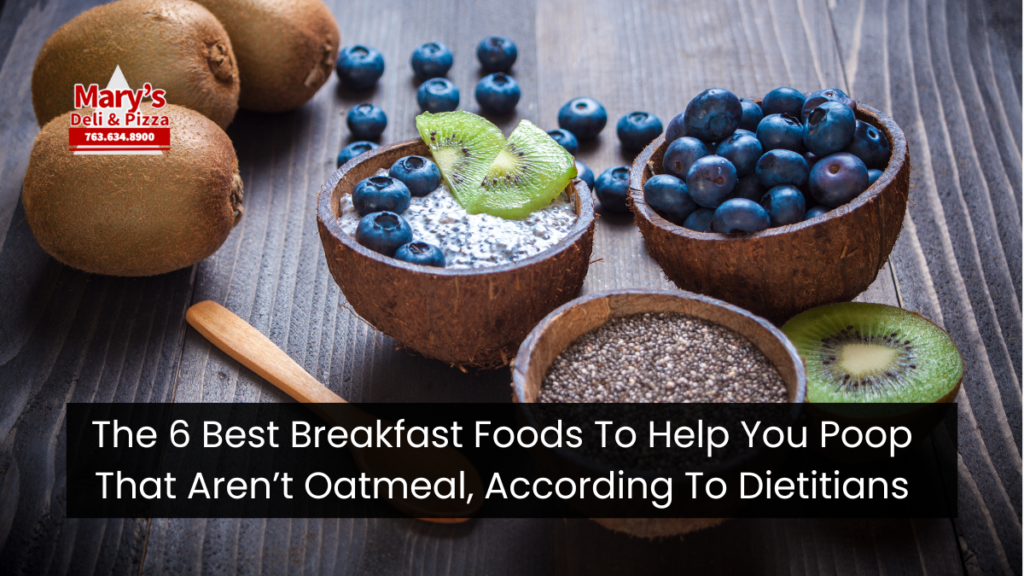Dealing with constipation can be uncomfortable, but incorporating the right foods into your diet can help. While oatmeal is a go-to solution for many, there are other fiber-packed breakfast options that can help relieve constipation effectively.
Whether you’re bored with oatmeal or just want variety, here are six breakfast foods recommended by dietitians that can help keep things moving.
1. Whole-Grain Cereal
Whole grains are a rich source of fiber, which is essential for digestion. If you’re in a hurry in the morning, grabbing a bowl of ready-to-eat whole-grain cereal can give your digestive system a healthy boost. Sylvia Klinger, M.S., RDN, points out that most adults don’t meet their daily fiber requirements—90% of women and 97% of men fall short of the recommended 28 to 34 grams of fiber per day.
What To look For:
- Choose cereals that list whole grains (like whole wheat, bulgur, barley, oats, or quinoa) as the first ingredient.
- Ensure your cereal contains at least 3 grams of fiber per serving.
- Keep added sugars in check—choose options with no more than 10 grams of sugar per serving.
This quick option helps you maintain digestive health, and the fiber in whole grains adds bulk to your stool, making it easier to pass.
2. Kiwi
When it comes to natural remedies for constipation, kiwi is a powerful contender. This small fruit packs a punch with 2 grams of fiber per fruit. The fiber in kiwi helps to pull water into the gut, improving stool consistency and ease of movement.
Additional Benefits Of kiwi:
- Contains the enzyme actinidin, which helps aid digestion without causing gas or bloating, making kiwi an ideal choice for those with sensitive digestive systems.
- Recommended intake is two kiwis per day to keep your digestive system regular.
To make kiwi even easier to incorporate into your breakfast routine, you can cut and freeze them ahead of time for smoothies or as a quick snack. Dietitian Kate Scarlata highlights kiwi as her top recommendation for constipation relief.
3. Blackberries
If you’re looking for a tasty way to add fiber to your diet, blackberries are an excellent choice. A single cup of blackberries delivers a whopping 8 grams of fiber, which is equivalent to the fiber content of two cups of cooked oatmeal. They also contain sorbitol, a natural laxative that draws water into the colon and helps soften stools for easier evacuation.
Fresh vs. Frozen:
- Fresh blackberries are excellent, but frozen blackberries are just as effective, more affordable off-season, and incredibly convenient to keep on hand.
- Add them to a smoothie, sprinkle them over yogurt, or enjoy them as a snack.
Blackberries are not only delicious, but their high fiber content makes them one of the most effective fruits for improving digestive health.
4. Chia Seeds
Chia seeds are often hailed as one of the most powerful natural remedies for constipation. Just two tablespoons of chia seeds contain an impressive 10 grams of fiber, much of which is soluble fiber. When mixed with water, soluble fiber forms a gel-like substance that lubricates the intestines and helps things move smoothly.
How To Incorporate Chia Seeds:
- Add them to a smoothie.
- Make chia pudding or sprinkle them on your yogurt or salad.
- Dietitian Amy Kimberlain recommends starting with 1 tablespoon and adding more as your body adjusts.
Chia seeds work quickly and effectively, making them one of the best foods to get things moving.
5. Quinoa
For those who love a warm breakfast but want to switch things up from oatmeal, quinoa is a fantastic alternative. One cup of cooked quinoa delivers 5 grams of fiber. Quinoa is versatile, making it easy to use in sweet or savory breakfast dishes. Plus, it’s a great make-ahead meal that you can prepare in batches and store for quick breakfasts throughout the week.
How To Use Quinoa:
- Make a warm quinoa breakfast bowl with cinnamon, fruit, and nuts.
- Use leftover quinoa from dinner in a chia seed-infused overnight pudding.
- Try quinoa flakes for a quicker option—these are simply rolled quinoa seeds that retain the same nutritional benefits.
Quinoa is packed with nutrients and offers a good amount of fiber to help keep your digestive system in check.
6. Beans
Beans are one of the most fiber-dense foods, providing around 17 grams of fiber per cup. Including beans in your breakfast not only supports regular digestion but also gives you a fiber boost that lasts throughout the day.
Ways To Enjoy Beans For Breakfast:
- Make refried beans for breakfast and top with eggs, avocado, and salsa.
- Spread beans on toast or a tostada for a satisfying meal.
- If you’re worried about the gassiness associated with beans, soaking dried beans or rinsing canned beans before cooking can help reduce gas-producing carbohydrates.
Beans are an underutilized breakfast food, but they are excellent for keeping your digestive system on track.
Other Tips For Better Digestion
In addition to eating the right foods, there are other simple strategies to prevent constipation:
- Take a walk: Physical movement helps stimulate your gut and get things moving.
- Drink more water: Staying hydrated helps fiber do its job more effectively by softening the stool.
- Manage stress: The brain and gut are connected, so too much stress can slow digestion. Try deep breathing exercises to help your body relax.
- Listen to your body: If you feel the urge to use the restroom, don’t delay. Ignoring it can lead to worsening constipation.
Conclusion:
Including these fiber-rich breakfast foods in your diet can significantly improve your digestive health. From whole-grain cereal and kiwi to chia seeds and beans, these options can help you reach your daily fiber goal and keep your digestion on track. Combine these foods with plenty of water, regular movement, and stress management for the best results in maintaining regularity.
FAQs
1. Can I Eat Any Other Fruits Besides Kiwi And Blackberries To Help Relieve Constipation?
Yes! Fruits like prunes, pears, and apples are also high in fiber and can promote healthy digestion.
2. How Much Fiber Should I Aim For Daily To Avoid Constipation?
The recommended daily fiber intake is 28 to 34 grams, depending on your age and gender.
3. Will Eating Chia Seeds Cause Bloating?
Start with a small portion of chia seeds (around 1 tablespoon) to avoid bloating, then gradually increase the amount as your body adjusts to the higher fiber intake.
4. How Long Does It Take For These Foods To Relieve Constipation?
You may notice relief in 24 to 48 hours after incorporating high-fiber foods into your diet.
5. Can I Eat Quinoa Instead Of Oatmeal Every Day?
Absolutely! Quinoa is a great source of fiber and nutrients and can be eaten daily as a healthy alternative to oatmeal.






